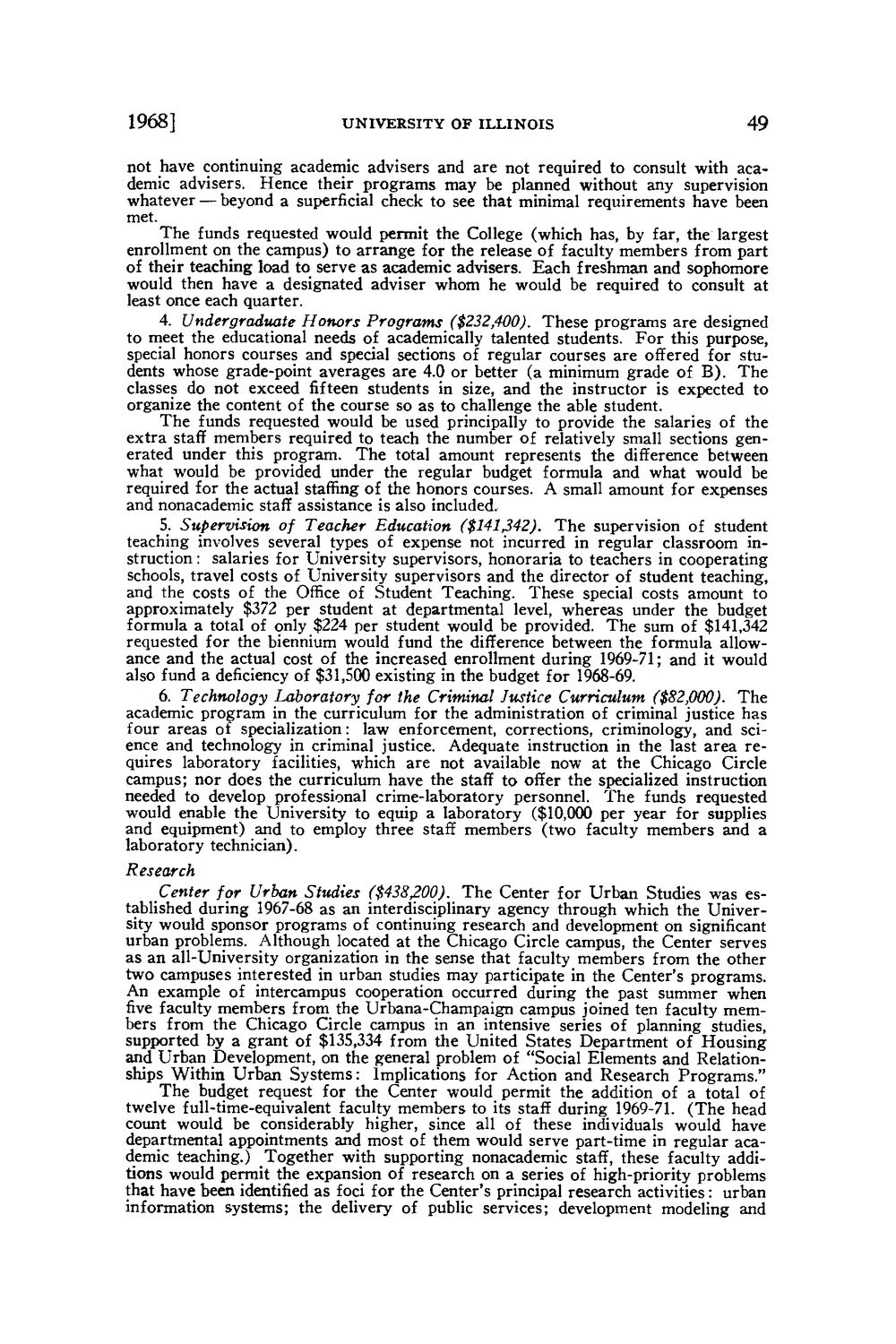| |
| |
Caption: Board of Trustees Minutes - 1970
This is a reduced-resolution page image for fast online browsing.

EXTRACTED TEXT FROM PAGE:
1968] UNIVERSITY OF ILLINOIS 49 not have continuing academic advisers and are not required to consult with academic advisers. Hence their programs may be planned without any supervision whatever — beyond a superficial check to see that minimal requirements have been met. The funds requested would permit the College (which has, by far, the largest enrollment on the campus) to arrange for the release of faculty members from part of their teaching load to serve as academic advisers. Each freshman and sophomore would then have a designated adviser whom he would be required to consult at least once each quarter. 4. Undergraduate Honors Programs ($232,400). These programs are designed to meet the educational needs of academically talented students. For this purpose, special honors courses and special sections of regular courses are offered for students whose grade-point averages are 4.0 or better (a minimum grade of B). The classes do not exceed fifteen students in size, and the instructor is expected to organize the content of the course so as to challenge the able student. The funds requested would be used principally to provide the salaries of the extra staff members required to teach the number of relatively small sections generated under this program. The total amount represents the difference between what would be provided under the regular budget formula and what would be required for the actual staffing of the honors courses. A small amount for expenses and nonacademic staff assistance is also included. 5. Supervision of Teacher Education ($141^342). T h e supervision of student teaching involves several types of expense not incurred in regular classroom instruction : salaries for University supervisors, honoraria to teachers in cooperating schools, travel costs of University supervisors and the director of student teaching, and the costs of the Office of Student Teaching. These special costs amount to approximately $372 per student at departmental level, whereas under the budget formula a total of only $224 per student would be provided. The sum of $141,342 requested for the biennium would fund the difference between the formula allowance and the actual cost of the increased enrollment during 1969-71; and it would also fund a deficiency of $31,500 existing in the budget for 1968-69. 6. Technology Laboratory for the Criminal Justice Curriculum ($82,000). The academic program in the curriculum for the administration of criminal justice has four areas of specialization: law enforcement, corrections, criminology, and science and technology in criminal justice. Adequate instruction in the last area requires laboratory facilities, which are not available now at the Chicago Circle campus; nor does the curriculum have the staff to offer the specialized instruction needed to develop professional crime-laboratory personnel. The funds requested would enable the University to equip a laboratory ($10,000 per year for supplies and equipment) and to employ three staff members (two faculty members and a laboratory technician). Research Center for Urban Studies ($438^00). The Center for Urban Studies was established during 1967-68 as an interdisciplinary agency through which the University would sponsor programs of continuing research and development on significant urban problems. Although located at the Chicago Circle campus, the Center serves as an all-University organization in the sense that faculty members from the other two campuses interested in urban studies may participate in the Center's programs. An example of intercampus cooperation occurred during the past summer when five faculty members from the Urbana-Champaign campus joined ten faculty members from the Chicago Circle campus in an intensive series of planning studies, supported by a grant of $135,334 from the United States Department of Housing and Urban Development, on the general problem of "Social Elements and Relationships Within Urban Systems: Implications for Action and Research Programs." The budget request for the Center would permit the addition of a total of twelve full-time-equivalent faculty members to its staff during 1969-71. (The head count would be considerably higher, since all of these individuals would have departmental appointments and most of them would serve part-time in regular academic teaching.) Together with supporting nonacademic staff, these faculty additions would permit the expansion of research on a series of high-priority problems that have been identified as foci for the Center's principal research activities: urban information systems; the delivery of public services; development modeling and
| |